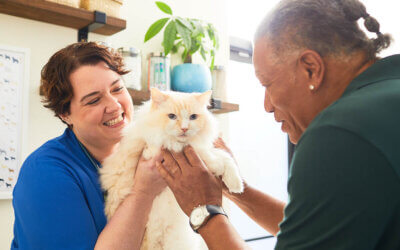Unless you have a foolproof system in place, there is a good chance your practice is missing charges on a daily basis.
Is missing charges that big of a problem?
In short, yes. Let’s take a look and run through an example.
Let’s say that a client walks in for an appointment and hands the receptionist a stool sample for their dog. Not wishing to allow its oh-so-pleasant aroma to spread through your waiting room, your receptionist brings it into the lab and returns to her duties while waiting for an available exam room. Eventually, she puts the client in a room and lets the medical staff know the client is ready. Her role is done in this story until the client cashes out, which may not even be done by her.
Next, your assistants/technicians and doctor do their parts. The patient is examined, the owner is presented with a treatment plan which doesn’t include the stool sample because the technical staff had no idea it was sitting in the lab. The owner is so concerned about their pet and is focused on the grand total of the treatment plan that they don’t notice the stool sample analysis is not on there. Treatments are done, the owner cashes out at your front desk and leaves.
Then someone walks into the lab and says, “Hey, whose stool sample is this?” You can decide to run it and eat the cost so you don’t look like you have a communication problem in your practice. You could also contact the owner and let them know the cost of the analysis was not on their treatment plan because you were unaware they brought it in and it will be an additional expense if they want you to still run it.
Let’s say the client cost of the stool sample is $28. How many clients are going to accept another $28 bill when they thought they had paid in full after they just walked out your door? How many of them are going to tell you to just throw it away?
The likelihood of getting paid for that fecal analysis is slim to none. So, let’s think about the ways this impacts your practice, your clients, and your patients.
Missing charges = lost revenue
The obvious first problem is a loss of revenue.
If this happens twice a week, that’s $56 a week. In the grand scheme of things, it doesn’t sound like much but let’s explore a little bit further. At twice a week, that’s $224 a month which ends up being $11,648 a year. You heard me right, almost $12,000 lost and that’s just on stool samples alone.
Imagine the other charges that aren’t making it on your invoices and how that affects your bottom line. A bit of an eye opener right?
Think about some of the more costly treatments. For example, an additional x-ray at $70. We do these all the time right? Did that charge get lost in a complicated treatment plan with a lot of charges to enter? If that happens twice a month that’s $140. In the span of 12 months, it’s up to $1,680. If that doesn’t sound like a lot to you, add that into the lost revenue from missed stool sample charges and now you’re up to $13,328. That’s the lost revenue from only two services. You can bet there are more.
Are you sweating yet?
Consider how that kind of lost revenue might impact your practice. That could certainly affect your staffing. Perhaps you wanted to hire extra help for the summer but based on current numbers it doesn’t look financially feasible. Maybe you would like to give performance-based pay increases but you don’t have the budget you wanted to, because of the lower numbers.
Again, revenue is not the only thing affected negatively here.
Missing charges = poor customer experience
If you call your client and tell them you forgot to charge them for a stool sample analysis because you didn’t know the receptionist put it in the lab, how do you think that is going to make the communication in your practice look?
Not great! If that happened to me as a client and I know that I handed it to the receptionist, I would be asking myself, “If they can’t communicate about a simple stool sample successfully, what else are they screwing up?”
Of course, we know better that it is just a simple mistake and we are very busy people. But if you give room for a client to make a negative assumption, chances are they’ll make one. They might also think, “Oh sure, I just paid X amount of dollars and you just want more.”
They may be understanding and happily pay over the phone, but in most cases, I have found that they elect to throw the sample out. If it was such an important recommendation, you would have remembered to put it on the treatment plan, right?
If that sample gets tossed, there’s still someone else who is affected.
Missing charges = poor patient care
Don’t forget the patient. After all, they’re the reason we all do what we do!
It’s generally the recommendation to run a screening stool analysis once a year. This year, this patient didn’t get it done because we forgot to charge the owner, and they declined when we asked for payment after the fact. What if that stool sample was actually positive for something and the patient was not yet symptomatic?
All of these consequences shouldn’t be taken lightly. A client whose confidence isn’t as high as it once was, a patient who didn’t get the level of care you strive for, and a lower bottom line: None of us want any of these things.
So, it’s important to put systems in place that reduce the likelihood of missing charges. Are you ever going to be 100% perfect all the time? Probably not, unless you’re not a human being. But you can make a difference.
Put a system in place to reduce missing charges
What do these systems look like? They can be anything!
Maybe you use a travel sheet and the receptionist is required to highlight a stool sample analysis when she accepts the sample. Maybe you use EMRs and she automatically enters it into today’s plan. It can be really anything that works for you and there is always something you can come up.
Discuss it with the team members involved to brainstorm what makes sense for your practice. It’s not just stool samples, it’s lots of things. Hospitalized patients tend to be a good source for missed charges because there are multiple hands in the pot each day.
Maybe the closing tech goes through the ICU sheet at the end of the night and makes sure all treatments were entered in your EMR and charged appropriately. They could highlight each treatment to indicate that it has been accounted for. When the patient is discharged, the tech or doctor can clearly see all the highlighted lines and know that everything is in, even if they were not involved with the patient.
If you aren’t auditing records, now is the time to start
It’s important to audit records for missed charges. This can be done during your regular record audits. It’s up to you to decide what you want to do with missed charges but at the very least, you should be tracking them for improvement.
Find your missed charges and get the whole team involved in coming up with systems to catch those charges that fall through the cracks. Calculate the lost revenue, errors in medical entry from missed charges, and start to track and measure improvement.
Remember, it’s not all about the money, it’s about clients and patients too.
Meg Oliver, CVPM is the practice manager at a three-doctor, small animal and exotics practice in Syracuse, New York. She can be reached at [email protected].



